2017 SkS Weekly Climate Change & Global Warming Digest #7
Posted on 19 February 2017 by John Hartz
Story of the Week... El Niño/La Niña Update... Toon of the Week... Quote of the Week... Graphic of the Week... SkS in the News... Photo of the Week... SkS Spotlights... Video of the Week... Coming Soon on SkS... Poster of the Week... Climate Feedback Reviews... SkS Week in Review... 97 Hours of Consensus...
Story of the Week...
Scientists have just detected a major change to the Earth’s oceans linked to a warming climate
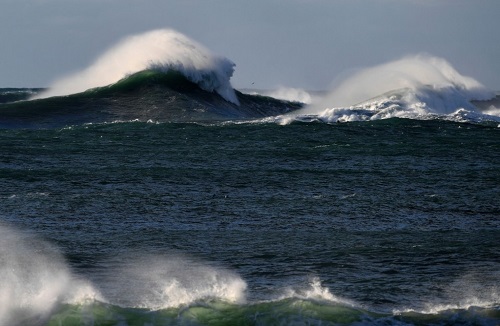
Big waves generated by the Nazare canyon just off the coast of Nazare, central Portugal, in the Eastern Atlantic Ocean. (Francisco Leong/Agence France-Presse via Getty Images)
A large research synthesis, published in one of the world’s most influential scientific journals, has detected a decline in the amount of dissolved oxygen in oceans around the world — a long-predicted result of climate change that could have severe consequences for marine organisms if it continues.
The paper, published Wednesday in the journal Nature by oceanographer Sunke Schmidtko and two colleagues from the GEOMAR Helmholtz Centre for Ocean Research in Kiel, Germany, found a decline of more than 2 percent in ocean oxygen content worldwide between 1960 and 2010. The loss, however, showed up in some ocean basins more than others. The largest overall volume of oxygen was lost in the largest ocean — the Pacific — but as a percentage, the decline was sharpest in the Arctic Ocean, a region facing Earth’s most stark climate change.
The loss of ocean oxygen “has been assumed from models, and there have been lots of regional analysis that have shown local decline, but it has never been shown on the global scale, and never for the deep ocean,” said Schmidtko, who conducted the research with Lothar Stramma and Martin Visbeck, also of GEOMAR.
It’s official: The oceans are losing oxygen, posing growing threats to marine life by Chris Mooney, Energy & Environment, Washington Post, Feb 15, 2017
El Niño/La Niña Update...
During the second half of 2016, tropical Pacific Ocean surface temperatures were at borderline weak La Niña/cool-neutral levels. Many atmospheric ENSO indicators also approached or exceeded La Niña thresholds. During January 2017, tropical Pacific Ocean temperatures and some atmospheric fields clearly returned to ENSO-neutral levels. With weak La Niña signals since mid-2016, in some regions the influence of other climate drivers may have equaled or even outweighed that of ENSO.
Most of the climate models surveyed indicate neutral conditions will persist during the first half of 2017. Although there is a range of possibilities beyond May 2017, the re-emergence of La Niña appears the least likely scenario, with neutral ENSO conditions and El Niño both possible during the second half of 2017. National Meteorological and Hydrological Services will continue to closely monitor changes in the state of ENSO over the coming months.
El Niño/La Niña Update, World Meterological Organization (WMO), Feb 16, 2017
Toon of the Week...
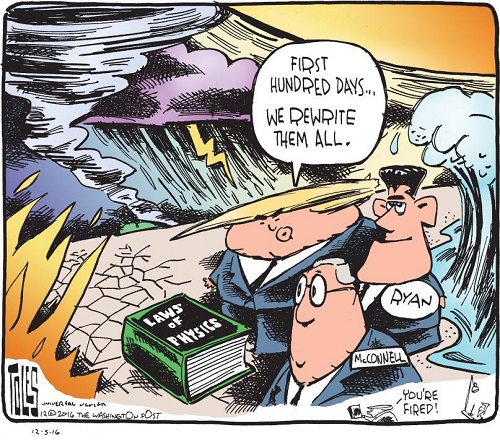
Hat tip to What on Earth? comics
Quote of the Week...
“Scott Pruitt as administrator of the EPA likely means a full-scale assault on the protections that Americans have enjoyed for clean air, clean water and a healthy climate,” Michael Brune, executive director of the Sierra Club, said in an interview. “For environmental groups, it means we’re in for the fight of our lives for the next four years.”
Scott Pruitt, longtime adversary of EPA, confirmed to lead the agency by Brady Dennis, Washington Post, Feb 17, 2017
Graphic of the Week...
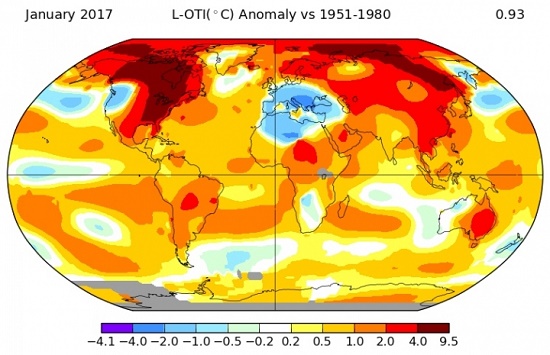
Data show large parts of Eurasia, North America and the Arctic were extremely warm for Jan. Credit: NASA
This January Was the Third Warmest on Record Globally by Brian Kahn, Climate Central. Feb 16, 207
SkS in the News...
In his BoingBoing post, How to fight back against the backfire effect, David McCraney cites and links to The Debunking Handbook.
John Cook's article, What do gorilla suits and blowfish fallacies have to do with climate change? originally published in the Conversation US has been reposted on a number of news sites including: AlterNet and DeSmog,
In his Boston Globe article, Mish Michaels isn’t alone: Many meteorologists question climate change science, David Apel writes:
A national survey last year by researchers at George Mason University in Virginia found that just 46 percent of broadcast meteorologists said they believed that climate change over the past 50 years has been “primarily or entirely” the result of human activity. By contrast, surveys of climate scientists have found that 97 percent attribute warming to human activity.
The second link embedded in the above is to Quantifying the consensus on anthropogenic global warming in the scientific literature, John Cook et al, Environmental Research Letters (ERL), Volume 8, Number 2, May 15, 2013
The ERL paper cited above was also referenced in Murray Energy CEO claims global warming is a hoax, says 4,000 scientists tell him so by Tom DiChristopher, CNBC.
Photo of the Week
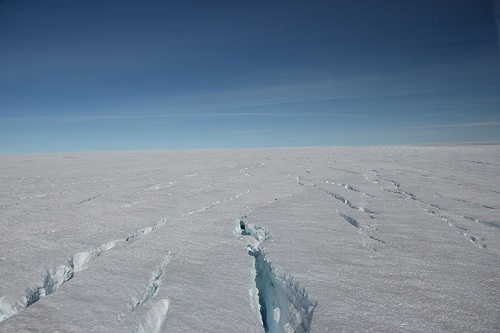
Greenland Ice Sheet: NASA Photo
NASA study identifies new pathway for Greenland meltwater to reach ocean by Maria-José Viñas, NASA's Global Climate Change, Feb 15, 2017
SkS Spotlights...
GEOMAR Helmholtz Centre for Ocean Research Kiel is one of the world’s leading institutes in the field of marine sciences. The institute investigates the chemical, physical, biological and geological processes of the seafloor, oceans and ocean margins and their interactions with the atmosphere. With this broad spectrum GEOMAR is unique in Germany. Additionally, the centre has successfully bridged the gap between basic and applied science in a number of research areas. The GEOMAR is a foundation under public law jointly funded by the federal (90 %) and state (10 %) government. GEOMAR has a staff of 967 (status on 30 June 2016) and a yearly budget of around 72 Mio Euro.
Video of the Week...
Michael Mann's Sydney Ideas Public Lecture - The Madhouse Effect: Climate Change Denial in the Age of Trump, University of Sydney, Feb 13, 2017
Coming Soon on SkS...
- Expect more emergencies like Oroville Dam in a hotter world (Dana)
- Climate Change – What We Knew and When We Knew It (greenman)
- Trump can save his presidency by saving the climate (Dana)
- Climate Bet for Charity, 2017 update (Rob Honeycutt)
- Guest Post (John Abraham)
- 2017 SkS Weekly Climate Change & Global Warming News Roundup #8 (John Hartz)
- 2017 SkS Weekly Climate Change & Global Waming Digest #8 (John Hartz)
Poster of the Week...
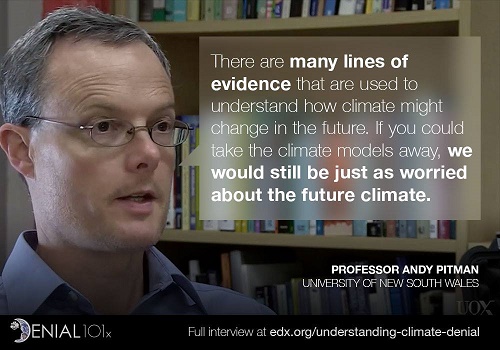
Climate Feedback Reviews...
Climate Feedback asked its network of scientists to review the op-ed, What California’s Dam Crisis Says About the Changing Climate by Noah S Diffenbach, New York Times, Feb 14, 2017
Three scientists analyzed the article and estimated its overall scientific credibility to be ‘high’. A majority of reviewers tagged the article as: Accurate
Click here to access the detailed review.
SkS Week in Review...
- 2017 SkS Weekly Climate Change & Global Warming News Roundup #7 by John Hartz
- Elevator Pitches - Chapter 01 - Ancient Sunlight by Rob Honeycutt
- Scientists study ocean absorption of human carbon pollution by John Abraham (Climate Consensus - the 97%, Guardian)
- Is anything wrong with Forbes Climate Reporting? by Sarah
- Why claiming that climate scientists are in it for the money is absurd by BaerbelW
- This is why conservative media outlets like the Daily Mail are 'unreliable' by Dana Nuccitelli (Climate Consensus - the 97%, Guardian)
- 2017 SkS Weekly Climate Change & Global Warming Digest #6 by John Hartz
97 Hours of Consensus...
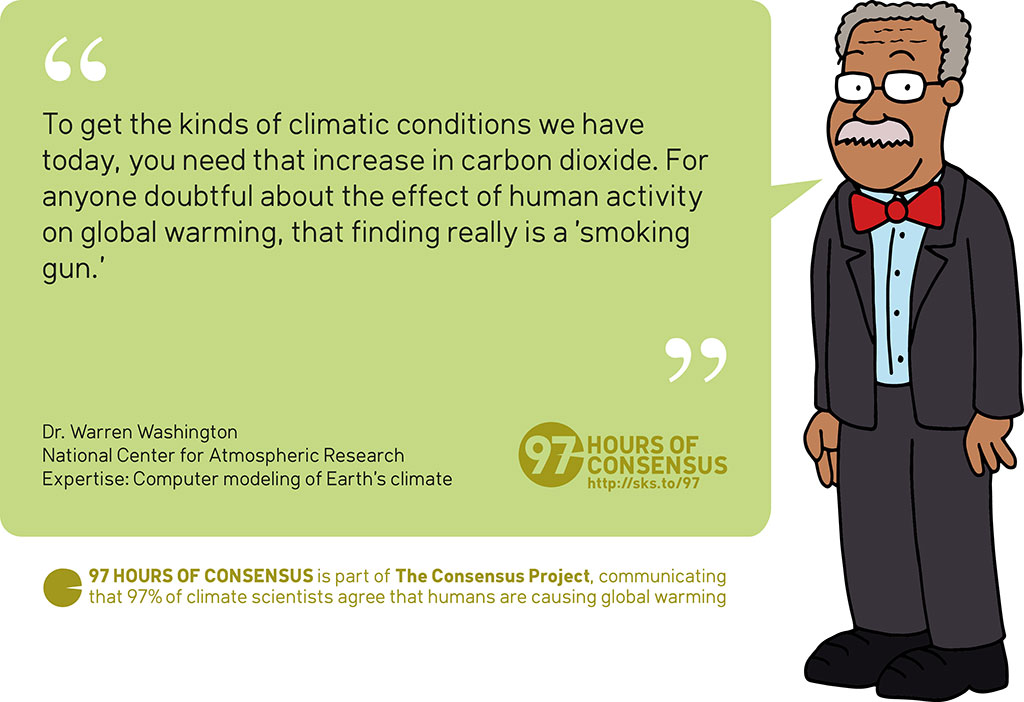































 Arguments
Arguments






























Comments